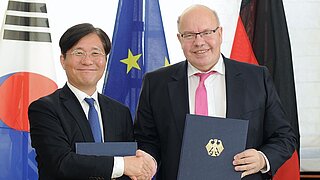About the Energy Partnership

In December 2019, Peter Altmaier, Federal Minister for Economic Affairs and Energy (BMWi), and Yunmo Sung, Minister of Trade, Industry and Energy (MOTIE), signed a joint declaration of intent for the establishment of the Korean-German Energy Partnership. The Partnership operates with two Working Groups, which focus on Energy Transition and New Green Energy Technologies.
In May 2020, Thorsten Herdan, Director General for Energy Policy at the Federal Ministry for Economic Affairs and Energy (BMWi), and Young-joon Joo, Deputy Minister for Energy and Resources at the Korean Ministry of Trade, Industry and Energy (MOTIE), signed the roadmap that defines the framework for the future cooperation of the partnership.
Both countries agreed to set up a high level Cooperation Committee that meets at least once a year to discuss energy policy related issues as well as the means and results of cooperation.
The content related work of the Korean-German Energy Partnership is organized in three Working Groups:
Working Group on “Energy Transition”
- Overall policies on energy and energy transition
- Renewable energy deployment
- Renewable energy system integration
- Social acceptance of energy transition/renewable energy and citizen participation
- Policies and measures to increase energy efficiency and conservation in buildings, industry and transport
Working Group on “New Green Energy Technologies”
The Working Group focuses on the assessment and promotion of new technologies that can make a significant contribution to energy transition. These technologies include but are not limited to:
- Green hydrogen and power-to-x
- Smart grids and smart solutions (Virtual Power Plants, blockchain technologies, smart applications for increasing energy efficiency and conservation, etc.)
- Energy storage systems (ESS)
Working Group on “Nuclear Decommissioning”
This Working Group has been discontinued in 2023 because the responsibilities for the topic "nuclear decomissioning" have shifted from the German Federal Ministry of Economic Affairs and Climate Change (BWMK) to the Federal Ministry for the Environment, Nature Conversation, Nuclear Safety and Consumer Protection (BMUV).
The Working Group focuses on all relevant aspects of nuclear decommissioning, such and decommissioning methods, nuclear waste disposal, safety issues, legal aspects and costs.
The Working Groups strive to enable exchanges, share best practices and identify concrete proposals for cooperation, such as joint studies, study trips or even the initiation of joint demonstration projects.
The Korean-German Energy Day that already took place twice before the establishment of the official energy partnership, continues to be major annual event for bilateral energy policy exchange between policy makers, industry, research and civil society of the two countries.